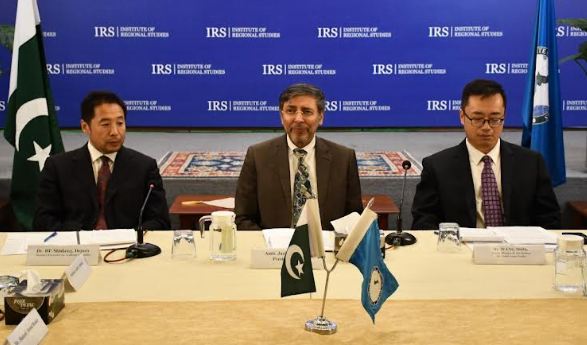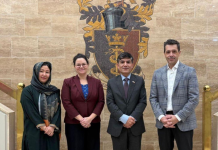ISLAMABAD, NOV 14 /DNA/ – The Institute of Regional Studies (IRS), Islamabad, organized a high-level roundtable on “Pakistan–China Convergence of Interests in the Evolving Geopolitical Dynamics” with a visiting delegation from the China Institute of Contemporary International Relations (CICIR) and leading policy experts. The discussion focused on the shifting global order and the enduring strategic partnership between Pakistan and China.
In his welcome remarks, Ambassador Jauhar Saleem, President of IRS, outlined the long-standing history of cooperation between Pakistan and China, noting that the relationship has consistently withstood regional and global turbulence and emerged as a stabilizing force in an era of rapid change. He highlighted that the world is undergoing a profound transition driven by artificial intelligence—threatening millions of jobs—alongside the existential challenge of climate change and the reconfiguration of the global economy along more protectionist lines. Ambassador Saleem stressed that East and South Asia, home to half the world’s population, are experiencing accelerated transformation amid U.S.–China competition, Indo-Pacific strategies, and containment efforts that risk provoking a “Thucydides Trap.” He pointed to persistent challenges emanating from India and Afghanistan, affecting Pakistan and other regional states. Despite these pressures, Pakistan–China relations continue to deepen, particularly through economic cooperation under the China–Pakistan Economic Corridor (CPEC), as well as robust defense collaboration, and a shared worldview founded on peaceful coexistence, non-interference, and mutual respect and cooperation.
Dr. Hu Shisheng, Deputy Secretary-General of the Academic Committee at CICIR, observed that the “old world order” is disintegrating while a new one has yet to emerge. He argued that the rule-based international order is weakening and that globalization is receding, citing rising protectionism and tariff barriers. Dr. Hu noted that China’s rise is not only economic but also technological, with the Global South increasingly becoming a significant force in technological innovation. He reflected on new modes of warfare, referencing Pakistan-India clashes, and emphasized the need for integrated defense systems. He also discussed cross-border tensions between Pakistan and Afghanistan, the evolving Pakistan–Saudi relationship, and shifting geopolitical trends in the Middle East and South Asia. While acknowledging the opportunities presented by artificial intelligence, he cautioned against the risks, stressing the need for careful management. Dr. Hu underscored that Pakistan and China must stand together to confront shared challenges such as climate change, trade disruptions, and terrorism, and highlighted the importance of ensuring that CPEC’s second phase becomes a success story centered on industrial development.
Dr. Azhar Ahmad, Professor of International Relations, underscored the natural convergences between Pakistan and China, predicting that these ties will strengthen further. However, he warned that centrifugal forces are working to impede the relationship. He stressed the importance of sustained dialogue and public outreach to ensure that broader society remains informed and supportive of the partnership. Dr. Ahmad expressed optimism about CPEC’s trajectory, noting that regional stability would allow the initiative to expand and deepen.
Dr. Wang Shida, Deputy Director of the Institute for South Asian Studies at CICIR, highlighted the rapidly shifting geopolitical environment. He commended Pakistan’s defense capabilities in deterring aggression and noted the improved relations between Pakistan and Bangladesh following the 2024 change in government. He emphasized the need for practical cooperation across all sectors while underscoring that strategic cooperation remains paramount. Dr. Wang reaffirmed China’s continued support for Pakistan in counterterrorism efforts and called for further strengthening of military collaboration.
Shakeel Ahmad Ramay, from the Asian Institute of Eco-civilization, Research and Development, offered an in-depth reflection on the evolution of diplomacy and economic relations. He contrasted the post-Westphalian diplomatic order with the economic transformations ushered in by successive industrial revolutions—particularly the fourth industrial revolution, which has reshaped global value chains and cooperative models. He argued that Pakistan must elevate its diplomatic approach to align with contemporary economic dynamics. Mr. Ramay posed a critical question: why has Pakistan’s military and diplomatic cooperation with China been exemplary while economic outcomes remain limited? He emphasized the need for stronger implementation mechanisms, noting persistent obstacles in the economic domain. On security matters, he urged a deeper examination of underlying causes, warning that Pakistan has become a central target for anti-China forces seeking to create vulnerabilities around China and undermine its partnerships. He cautioned that such efforts aim to destabilize Pakistan and deter China from expanding cooperation. He concluded that Pakistan and China must work jointly to overcome these challenges, ensuring that economic cooperation matches the strength of their military and diplomatic ties, and called for a rethinking of economic diplomacy to complement strategic alignment.
Dr. Rizwan Naseer, Senior Research Fellow at IRS, stressed that the international community increasingly expects China to play a larger role in global conflict resolution. He argued that China requires a clear strategic vision to complement the Belt and Road Initiative (BRI) and must develop counterbalancing strategies to respond to emerging global challenges. He emphasized the urgency of a coordinated Pakistan–China counterterrorism strategy, noting that such cooperation is essential for regional stability.
The roundtable concluded by reaffirming the shared commitment of Pakistan and China to deepen cooperation across economic, strategic, and security domains, ensuring that their partnership continues to serve as a pillar of stability in an evolving global landscape.

















